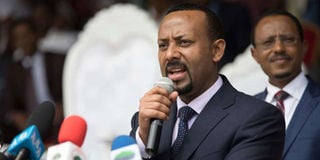Africa backs Ethiopia protest against UN human rights Council session

Ethiopian Prime Minister Abiy Ahmed.
African countries have rallied behind Ethiopia in protesting against a planned special session at the UN Human Rights Council that was meant to reprimand Addis Ababa’s alleged war atrocities in the Tigray region.
On Tuesday, none of the continent’s 13 representatives on the 47-member body of the UN, based in Geneva, backed a proposal for the Human Rights Council to discuss Ethiopia as had been proposed by the European Union.
The session was due to be held later on Tuesday but the suggestion became controversial for lacking any African support, with most of its proponents mostly Western members of the Council including the United Kingdom, Germany, Italy, France and Denmark.
The revelations emerged a day after Ethiopia issued a call to members of the Council to reject what it called a “regrettable” move to have the Tigray war discussed with the aim of creating a special team to investigate war crimes in the country.
Prime Minister Abiy Ahmed’s government said the move had a “politically motivated objective” and accused some members of the human rights body of choosing “to advance their political agenda through the work of the Council”.
“Ethiopia therefore calls on members of the Council to categorically reject and vote against the special session and its politically motivated outcome,” Ethiopia’s ministry of foreign affairs said on Monday in a statement.
“What should have been a priority for the Council instead was the urgent task of (investigating) the violations of human rights and atrocities committed by the TPLF (Tigray People’s Liberation Front) terrorist group in the Afar and Amhara regional states. It is unfortunate to witness that no such call has come forth from some in the Council.
The controversial proposal emerged last Friday, pushed by the European Union. On Monday, EU’s head of delegation to the UN in Geneva, Lotte Knudsen, wrote a joint letter with Slovak permanent representative to the UN in Geneva, Anita Pipan, asking for a special session “because of the importance and urgency of the situation” in Ethiopia.
Endorsed by other members
They said the request had the support of both members and observer states of the Human Rights Council, such as the US (which only returned to supporting the body after President Donald Trump left power.) As is the rule, such a move required at least a third of the members to support it and according to the letter, 17 members and 35 non-members endorsed the call.
None of Africa’s members endorsed the move and none of the non-members who supported the call came from Africa. The continent is represented by Burkina Faso, Cameroon, Ivory Coast, Gabon, Eritrea, Libya, Malawi, Namibia, Senegal, Somalia, Sudan and Togo. They are all serving three-year terms on the Council, although their start dates are staggered as is the tradition.
The call, though, has been endorsed by other members, including South Korea, Fiji, Ukraine, Japan, Poland, Netherlands, Mexico and Bulgaria.
“The Human Rights Council has to stand up to its responsibilities," Knudsen said on Monday, amplifying the call by EU High Representative Josep Borrel, who had said the world has not reacted “properly to the large-scale human rights violations, mass rapes using sexual violence as a war arm, killings and concentration camps based on ethnic belonging”.
The problem, though, says Ethiopia, is that discussing its war with TPLF appears to repeat what has already been done: Earlier in August, the Ethiopian Human Rights Commission and the UN High Commissioner for Human Rights conducted a joint investigation into alleged human rights violations and abuses, and violations of international humanitarian law, and refugee law.
The investigation found that both the TPLF and the Ethiopian government forces and allied militia had committed atrocities, including killings, rape, forcible displacement and torture.
But it did not find evidence of genocide. Ethiopia says it has since formed a multi-agency task force to implement some of the proposals in the report, including prosecution, rehabilitation of those who surrender, providing humanitarian services and assisting those who were sexually violated.
But the war continues. The TPLF, once a ruling party, has been fighting government forces since November last year. The war has led to a serious humanitarian crisis, besides causing deaths of civilians, according to the UN.





